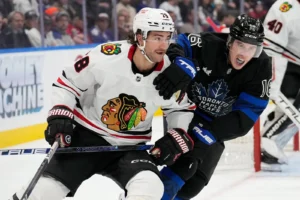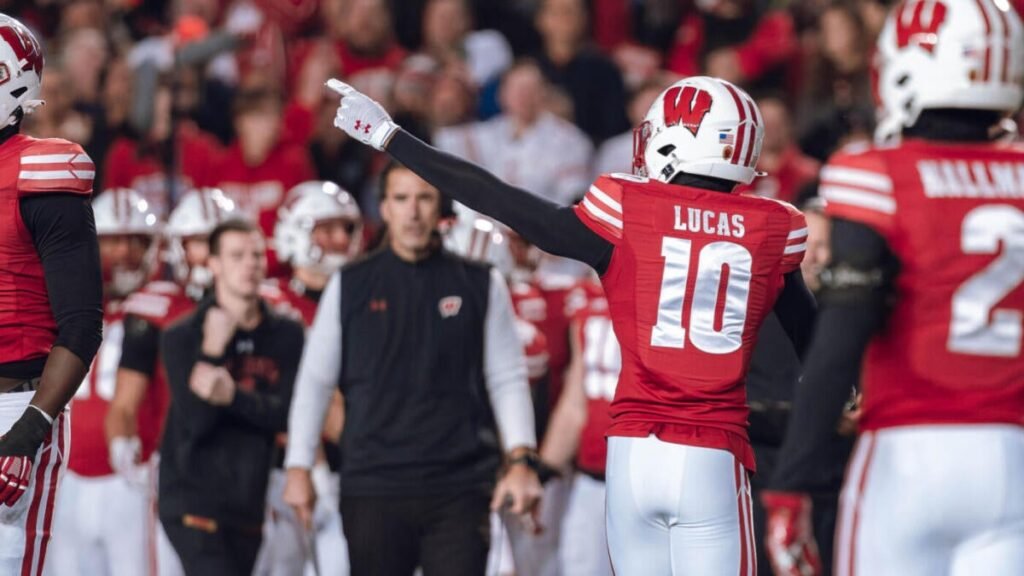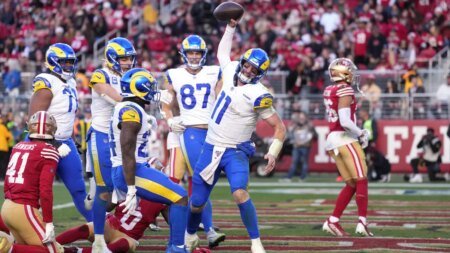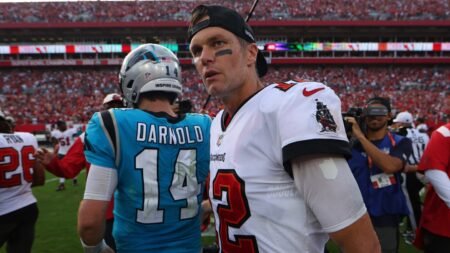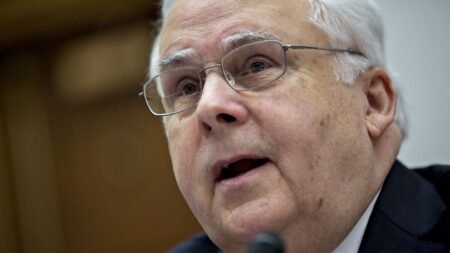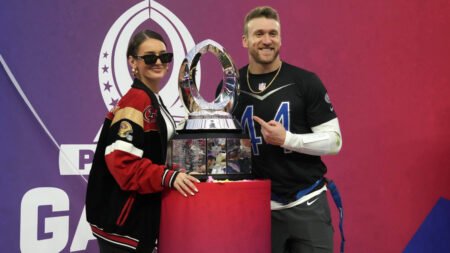The legal enforceability of a revenue share agreement between a football player and institution is at the crux of a landmark legal case between two Power Four schools that could have wide-ranging implications.
The University of Wisconsin sued the University of Miami on Friday over alleged tampering and tortious interference of a two-year agreement with defensive back Xavier Lucas, a member of the Badgers’ 2024 team. Lucas is not mentioned by name in the lawsuit — only referred to as Student-Athlete A — but all of the details line up after he left Wisconsin in January to join Miami’s football program as the No. 1 cornerback in the transfer portal.
Wisconsin alleges that Miami intentionally interfered and tampered with Lucas’ deal with the Badgers not long after he received a substantial payment following the deal’s execution.
“Miami’s interference caused Student-Athlete A to breach the university contract, resulting in great harm to UW-Madison,” the complaint alleges. “Such harm includes, without limitations, loss of a student-athlete with valuable NIL rights who plaintiff UW-Madison anticipated having in UW-Madison’s program for the 2025 football season and beyond. Further harms include the loss of financial benefits UW-Madison stood to receive from Student-Athlete A’s continued participation in its football program.”
Wisconsin wants compensation for the financial and reputational harm it and collective VC Connect suffered in losing Lucas, but what it really wants is to set a precedent. If successful, Wisconsin’s lawsuit could have a significant impact in decreasing tampering and increasing roster stability in what has been years’ worth of unregulated free agency in college athletics. Its decision to bring a lawsuit at all is noteworthy — and months in the making.
The buildup to the lawsuit
Dec. 17, 2024, could prove to be one of the more important days in college football history.
That was the day Lucas informed his Wisconsin position coach he intended to enter the transfer portal, despite signing a two-year revenue share agreement with the school on Dec. 2. That request came as a complete surprise to Wisconsin coaches, especially because earlier that day Lucas had texted a Wisconsin coach about the jersey number he wanted for the 2025 season.
Wisconsin, after giving Lucas one of the largest revenue share deals on the team, had no interest in letting the defensive back leave. It believed the agreement was binding and was confused why Lucas wanted to leave after all his actions and words to that point indicated he was happy and excited to be a Badger moving forward.
While Lucas, a Florida native, relayed a family-related reason for wanting to transfer — Yahoo Sports reported that his father had a “serious, life-threatening illness,” according to his attorney — Wisconsin believed the true reason emerged Dec. 18 when one of Lucas’ family members said that Lucas had hosted a Miami coach and a prominent Miami alumnus at his home earlier that month.
(Darren Heitner, Lucas’ attorney, told CBS Sports of that allegation “This is false” and declined to comment further on the lawsuit).
Wisconsin informed Lucas and his family on Dec. 21 that it would not enter him into the transfer portal, believing there was a “reasonable expectation” that Lucas would continue “as a member of its football program until at least the conclusion of the university contract,” according to the lawsuit.
After Wisconsin refused to budge on entering Lucas into the portal, he hired Heitner on Jan. 7 to try to negotiate a resolution. Heitner threatened to file an antitrust lawsuit over Wisconsin allegedly violating NCAA rules in its refusal to enter Lucas and sent over a notice to terminate the revenue share agreement.
Eventually, after the two sides couldn’t come to an amicable resolution, Lucas withdrew from Wisconsin on Jan. 17 and enrolled at Miami, believed to be the first time a player navigated around the transfer portal in that fashion. Miami allegedly offered Lucas a more lucrative contract than the one Wisconsin offered, according to the complaint.
Wisconsin and the Big Ten both issued strong statements the next day that signaled to many a lawsuit would be coming soon.
Wisconsin said it would “evaluate all options going forward to determine the appropriate course of action” while the Big Ten said, in part, “As student-athletes become active participants in revenue sharing, it is critical that agreed-to obligations be respected, honored, and enforced.”
And yet, nothing happened. For months.
As Wisconsin opted to work in the shadows, some wondered whether the statements were just strong talk and no action.
Heitner told CBS Sports in a late-April interview that Wisconsin was making a smart decision to not sue his client.
“There was a lot of sword waving, a lot of threats made to me and to the University of Miami, which is completely separate, because of what they call tampering,” Heitner said. “But they claimed they were going to enforce the agreement, that they hired local counsel down in Miami but it never amounted to anything. Maybe they still decide that they want to bring an action, but it’s been complete silence for months now.”
The issue, in Heitner’s estimation at the time, was the perception of suing an athlete.
“You can win the battle and lose the war,” he said. “If you’re suing an athlete who committed and attended your institution, number one, you didn’t even follow the NCAA rules in putting him in the transfer portal within 48 hours that you’re obligated to do so. You already were anti-athlete in a strong sense, and now you’re going to sue the athlete? Do recruits then want to go to Wisconsin when there are numerous other comparable options?”
That was a consideration, according to a source familiar with the situation, but the opportunity to set a precedent outweighed the potential negative optics. Wisconsin had used a standard revenue share agreement drafted by the Big Ten that focused on Name, Image and Likeness rights, and if no one was willing to actually enforce it, it threatened to significantly diminish its value. Those involved believe it demanded a shifting of mindset from treating student-athletes like kids to acknowledging there was significant money now at stake.
“They’re being paid hundreds of thousands of dollars and now they’re not allowing their picture to be used on the billboard or they’re not honoring their obligations or they’re not doing what they’re supposed to be doing,” said one source with direct knowledge of the situation. “It’s a different dynamic when there’s dollars involved.”
The Big Ten left it up to Wisconsin (and any subsequent university) to do what it wanted but it supported the school strenuously defending the integrity of the contract.
“We believe the contract itself is enforceable,” according to one high-ranking Big Ten source with direct knowledge of the situation.
That source added that “confidence is pretty high that it can” hold up to a legal challenge.
“No one can tell me why a contract shouldn’t be enforceable between an adult and an institution,” the Big Ten source told CBS Sports. “Contracts are enforceable in every other aspect of the commercial regulatory enterprise.”
Wisconsin ultimately opted not to include Lucas in its lawsuit, instead focusing on Miami’s alleged transgressions of tampering and tortious interference. In a statement to CBS Sports, the school said, in part, “While we reluctantly bring this case, we stand by our position that respecting and enforcing contractual obligations is essential to maintaining a level playing field.”
The stakes of the lawsuit
Talk to any college football coach and it’s a good bet he’ll have a strong distaste for tampering. Too many coaches and personnel directors to count have described to CBS Sports blatant and rampant tampering throughout college football that despite being against NCAA rules has gone unchecked because of nonexistent enforcement. The workarounds are so easy that it feels like a herculean task to police, let alone fix. It works as simply as this in many scenarios:
- A school calls a personal trainer connected to a player they’re interested in.
- The trainer calls the player
- The courtship begins
TCU coach Sonny Dykes summed it up well to us in a previous interview.
“There needs to be severe repercussions for it, but at the same time, you can’t prove any of this stuff. You can’t subpoena phone records,” Dykes said. “I’m a big believer in don’t have speed limits if you’re not going to write tickets. Let’s not have a bunch of rules if they aren’t going to be enforced. All that does is cheapen the game and our profession, quite frankly. You better have someone to write tickets to enforce those rules and right now there’s nobody doing that.”
If Wisconsin can successfully prove Miami tampered — and there are real ramifications for violating those rules — it could have a big impact on an industry seemingly crying out for help.
“I think a lawsuit of this magnitude certainly puts people on guard that the possibility of being sued or being a part of a lawsuit is a real thing,” Mitch Gilfillan, an attorney for Quinn Johnston and former Division I college basketball coach, told CBS Sports.
The key component will be the enforcement, whether in the court system in this case or within the new College Sports Commission which will police NIL and revenue share issues moving forward. In the NFL, the Miami Dolphins lost a first-round draft pick, were fined $1.5 million and owner Stephen Ross was suspended for being found guilty of tampering with quarterback Tom Brady. A penalty of that magnitude naturally serves as a deterrent against other bad behavior, though professional leagues have different protections, negotiated through collective bargaining, than currently available within college athletics.
“There need to be tighter parameters around what and what is not considered interference of someone’s trade,” Gilfillan said. “The NBA and the collective bargaining agreement has specific tampering restrictions for a reason that you are not allowed to do various things because it interferes with somebody’s contract they are under. When you’re under contract with a university it’s a fine line of employer-employee relationship, should somebody be allowed to poach you or tamper with you knowing you’re under contract?”
To Gilfillan’s point, it didn’t take long after Wisconsin filed its lawsuit for there to be online speculation from lawyers and sports industry folks that it could raise athlete employment issues.
The Big Ten revenue share template that Wisconsin used states that it is for NIL rights and not pay-for-play, though the lawsuit also claims that Lucas agreed to not play for another school for the duration of the two-year contract. Additionally, it claimed the revenue share agreement granted it “exclusive license” to Lucas’ NIL rights for those two years and that he could not grant them to any other institution during that time period.
The potential risks don’t stop there, however.
If a judge rules that the revenue share agreements aren’t binding and enforceable, it could open up the floodgates. Prominent football coaches such as Georgia’s Kirby Smart have recently advocated for reducing the transfer portal to only one winter window. But if withdrawing and enrolling elsewhere, despite having signed a contract, as Lucas did is a viable strategy with no negative ramifications, what’s stopping other players from leaving whenever they want without having to enter the portal as NCAA rules demand? If Miami wins, it could signal to some that tampering is fair game, too.
This all has the potential to turn a sport that has already frequently been described as the Wild West into an even bigger free-for-all right when leaders believed long-awaited solutions were finally coming with the House settlement approved. Imagine a world in which a school like Miami would pay a buyout that would count against its $20.5 million cap to acquire a player who entered the transfer portal still under contract.
Lawsuits have besieged college athletics for years now, dramatically reshaping core components of a multi-billion dollar ecosystem. Wisconsin v. Miami, the first in what could be multiple lawsuits over athlete revenue share agreements, has the potential to do the same.
Read the full article here

